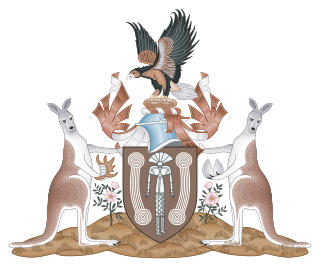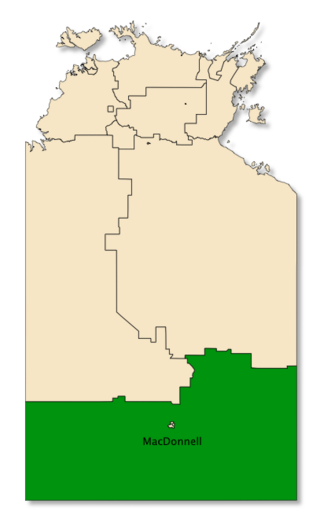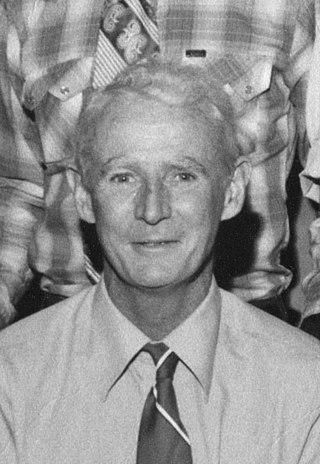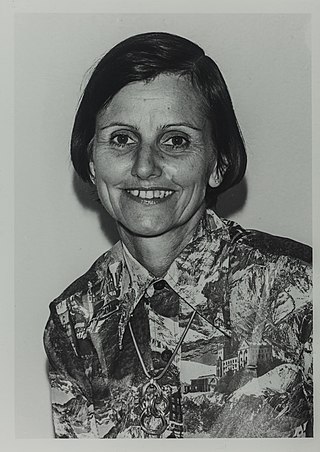
The chief minister of the Northern Territory is the head of government of the Northern Territory. The office is the equivalent of a state premier. When the Northern Territory Legislative Assembly was created in 1974, the head of government was officially known as majority leader. This title was used in the first parliament (1974–1977) and the first eighteen months of the second. When self-government was granted the Northern Territory in 1978, the title of the head of government became chief minister.

South West Africa was a territory under South African administration from 1915 to 1990, after which it became modern-day Namibia. It bordered Angola, Botswana, South Africa, and Zambia.

Marshall Bruce Perron is a former Australian politician, who was a Country Liberal Party member of the Legislative Assembly in the Northern Territory from the formation of the Assembly in 1974 until his resignation in 1995. For the last 20 years, save for an 11-month break in 1986 and 1987, he served as a cabinet minister or its equivalent. From 1988 to 1995, Perron was the Chief Minister of the Northern Territory.

The Legislative Assembly of the Northern Territory is the unicameral legislature of the Northern Territory of Australia. The Legislative Assembly has 25 members, each elected in single-member electorates for four-year terms. The voting method for the Assembly is the full-preferential voting system, having previously been optional preferential voting. Elections are on the fourth Saturday in August of the fourth year after the previous election, but can be earlier in the event of a no confidence vote in the Government. The most recent election for the Legislative Assembly was the 2020 election held on 22 August 2020. The next election is scheduled for 24 August 2024.
Following are lists of members of the Northern Territory Legislative Assembly:

This is a list of members of the Northern Territory Legislative Assembly from 1974 to 1977. This first Assembly only had limited powers, as the Northern Territory was not granted self-government until 1978.
A member of the Legislative Assembly (MLA) is a representative elected by the voters of a constituency to a legislative assembly. Most often, the term refers to a subnational assembly such as that of a state, province, or territory of a country. Still, in a few instances, it refers to a national legislature.

MacDonnell was an electoral division of the Legislative Assembly in Australia's Northern Territory. It was created in 1974, and derived its name from the nearby MacDonnell Ranges. MacDonnell was an almost entirely rural electorate, covering 333,398.61 km², and taking in the resort town of Yulara, and the remote communities of Hermannsburg, Kintore, Papunya and Docker River. There were 4,842 people enrolled within the electorate as of 2011.
Millner was an electoral division of the Legislative Assembly in Australia's Northern Territory. One of the Legislative Assembly's original electorates, it was first contested at the first election in 1974. It was named after the suburb of Millner, which in turn was named for James Millner, a doctor and early Australian explorer of the Northern Territory who drowned on the SS Gothenburg tragedy. It was abolished in 2008 and replaced with the new electorate of Fong Lim. Millner was an urban electorate, and at its abolition covered 22.74 km², taking in the suburbs of Millner, Coconut Grove, Ludmilla and part of Rapid Creek. There were 4434 people enrolled in the electorate as of June 2005.

Anthony Wilfred James Whitford is a retired Canadian politician, who served as the commissioner of the Northwest Territories from 2005 to 2010.

The Government of the Northern Territory of Australia, also referred to as the Northern Territory Government, is the Australian territorial democratic administrative authority of the Northern Territory. The Government of Northern Territory was formed in 1978 with the granting of self-government to the Territory. The Northern Territory is a territory of the Commonwealth of Australia, and the Constitution of Australia and Commonwealth law regulates its relationship with the Commonwealth.

Paul Anthony Edward Everingham is a former Australian politician who was the head of government of the Northern Territory of Australia from 1977 to 1984, serving as the second and last Majority Leader (1977–1978) and the first Chief Minister of the Northern Territory from 1978 to 1984. He represented the northern Darwin seat of Jingili in the Northern Territory Legislative Assembly from 1974 to 1984. He was then elected to the federal House of Representatives, representing the Northern Territory between 1984 and 1987.

A general election was held in the Northern Territory on Saturday 13 August 1977. Though the election was won by the incumbent Country Liberal Party (CLP), the party lost five of its seven executive members. Surprisingly, one of the casualties was Majority Leader Goff Letts—one of the few instances where a major-party leader at any level in Australia lost his own seat. The election also marked the emergence of the Labor Party as a parliamentary force: Labor took six seats in the new assembly.
The Australian Capital Territory House of Assembly was the main elected representative body of the Australian Capital Territory between 1975 and 1986, when preparations began to be made for the granting of self-government to the Territory. It served a largely advisory role, with most powers over the Territory still lying in the hands of the relevant federal minister through the life of the Assembly.
Roger Bede Nott was an Australian politician and a member of the New South Wales Legislative Assembly from 1941 until 1961. He was a member of the Labor Party and held numerous ministerial positions between 1954 and 1961. He was the Administrator of the Northern Territory between 1961 and 1964.

Cecilia Noel Padgham-Purich is an Australian former politician. She was a member of the Northern Territory Legislative Assembly from 1977 to 1997, representing Tiwi until 1983, Koolpinyah until 1990 and Nelson thereafter.
Roderick Carson Oliver was an Australian politician, who was a member of the Northern Territory Legislative Assembly for the seat of Alice Springs from 1977 to 1980.
The Everingham Ministry was the ministry of Paul Everingham, the last Majority Leader of the Northern Territory before the granting of self-government, and the first Chief Minister of the Northern Territory. It first took office in 1977 following the defeat of former Majority Leader Goff Letts and much of his executive at the 1977 election, and became a full ministry with self-government in 1978. It lasted until 1984, when Everingham resigned to enter federal politics.
The Letts Executive was the executive of Majority Leader of the Northern Territory Goff Letts, who led the Northern Territory from the implementation of the Northern Territory Legislative Assembly in 1974 until his defeat in his own seat at the 1977 election. It was the first ministry to come from the Legislative Assembly. He was the only head of government of the Northern Territory not to assume the title of Chief Minister of the Northern Territory, as self-government was not granted until 1978. His governments did not have anywhere near the range of powers available to Territory governments after the granting of self-government, but nevertheless fulfilled similar functions. Letts' successor as Majority Leader and his one-time deputy, Paul Everingham, became the first Chief Minister in 1978.

The Territory Labor Party, officially known as the Australian Labor Party (Northern Territory Branch) and commonly referred to simply as Territory Labor, is the Northern Territory branch of the Australian Labor Party. It has been the governing party of the Northern Territory since winning the 2016 election under Michael Gunner. It previously held office from 2001 to 2012.